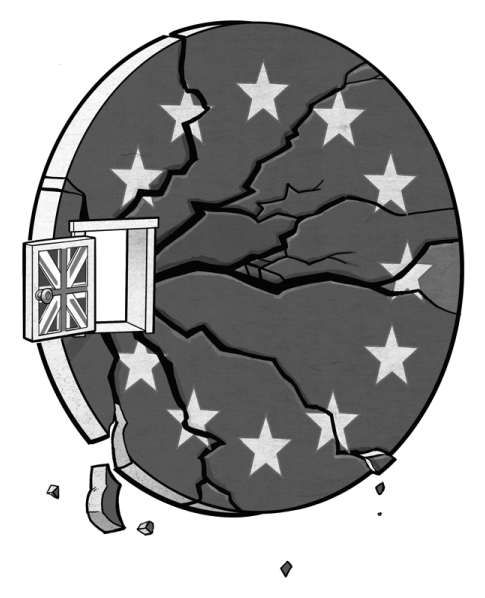 |
| Luo Jie / China Daily |
The United Kingdom had the best of all possible deals with the European Union; it was a member of the EU common market while having its own currency. Yet that was not enough to stop the British electorate from voting to leave. Why?
The answer could be seen in opinion polls in the months leading up to the referendum. The European migration crisis and the Brexit debate fed on each other. The "Leave" campaign exploited the deteriorating refugee situation-symbolized by frightening images of thousands of asylum-seekers concentrating in Calais, desperate to enter Britain by any means-to stoke fear of "uncontrolled" immigration from other EU member states. And the EU authorities delayed important decisions on the refugee policy in order to avoid a negative effect on the British referendum vote, thereby perpetuating scenes of chaos like the one in Calais.
German Chancellor Angela Merkel's decision to open her country's doors wide to refugees was an inspiring gesture, but it was not properly thought out, because it ignored the pull factor. A sudden influx of asylum-seekers disrupted people's everyday lives across the EU.
The lack of adequate controls, moreover, created panic, affecting everyone: the local population, the authorities in charge of public safety, and the refugees themselves. It has also paved the way for the rapid rise of xenophobic anti-European parties as national governments and European institutions seem incapable of handling the crisis.
Now the catastrophic scenario that many feared has materialized, making the disintegration of the EU practically irreversible. Britain eventually may or may not be relatively better off than other countries by leaving the EU, but its economy and people stand to suffer significantly in the short to medium term. The consequences for the real economy will be comparable only to the global financial crisis.
That process is sure to be fraught with further uncertainty and political risk, because what is at stake was never only some real or imaginary advantage for Britain, but the very survival of the European project. Brexit will open the floodgates for other anti-European forces within the EU. Indeed, no sooner was the referendum's outcome announced than France's National Front issued a call for "Frexit", while Dutch populist Geert Wilders promoted "Nexit".
Besides, the UK itself may not survive. Scotland, which voted overwhelmingly to remain in the EU, can be expected to make another attempt to gain its independence, and some officials in Northern Ireland, where voters also backed "Remain", have already called for unification with the Republic of Ireland.
The EU's response to Brexit could well prove to be another pitfall. EU leaders, eager to deter other member states from following suit, may be in no mood to offer the UK terms-especially on access to Europe's single market-which would soften the pain of leaving. With the EU accounting for half of British trade turnover, the impact on exporters could be devastating (despite a more competitive exchange rate). And, with financial institutions relocating their operations and staff to eurozone hubs in the coming years, London (and London's housing market) will not be spared the pain.
But the implications for the EU could be far worse. Tensions among member states have reached a breaking point, not only over the refugees, but also as a result of exceptional strains between creditor and debtor countries within the eurozone. At the same time, weakened leaders in France and Germany are now squarely focused on domestic problems. In Italy, a 10 percent fall in the stock market following Brexit signals the country's vulnerability to a full-blown banking crisis-which could well bring the populist Five Star Movement, which has just won the mayor's election in Rome, to power as early as next year.
The author is chairman of Soros Fund Management and Open Society Foundations.
Project Syndicate